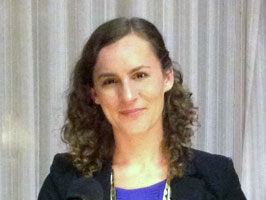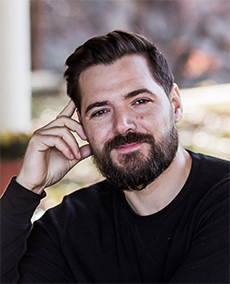Our Post-Doctoral Fellowship Training Program is training the next generation of ELSI scholars to develop independent research programs that address important ELSI problems related to psychiatric, neurologic, and behavioral disorders.
Post-Doctoral Fellows design and implement their research projects under supervision from Center Core Faculty, are part of a collegial and supportive group that encourages their development as investigators, undertake focused coursework to fill any gaps in their backgrounds, including in substantive or methodologic (including statistical) approaches, and receive training and guidance in grant seeking and grant writing. The Fellowship generally lasts 2 years.
Former Post Doctoral Fellows
Anna Jabloner, PhD
 Anna Jabloner holds a PhD in anthropology from the University of Chicago. She joined Columbia University’s Center for Research on Ethical, Legal & Social Implications of Psychiatric, Neurologic & Behavioral Genetics in September 2017. Previously, Dr. Jabloner held a postdoctoral fellowship at the Stanford Center for Biomedical Ethics. Her research focuses on uses of genetic technologies across the societal realms of clinic, industry, law and criminology in the United States. She is working on a book titled Future Pending: Californian Technology and the Politics of Biology, which tracks how growing genomic data infrastructures implicate Californians in a range of social engineering projects in biomedicine, genealogical industries and criminal justice. Dr. Jabloner’s current research addresses ethical, legal and social dimensions of genomics as they relate to psychiatry and behavioral disorders. She is interested more broadly in how socially positioned subjects in the U.S. enter into structurally different relationships with the biosciences, in particular in light of new projects to predict and prevent behaviors. Jabloner has taught courses in feminist science studies, gender studies and social science. Her scholarship has been published or is currently being reviewed by the journals Science as Culture, American Ethnologist and Nature Biotechnology. Anna Jabloner can be reached at aj2805@columbia.edu.
Anna Jabloner holds a PhD in anthropology from the University of Chicago. She joined Columbia University’s Center for Research on Ethical, Legal & Social Implications of Psychiatric, Neurologic & Behavioral Genetics in September 2017. Previously, Dr. Jabloner held a postdoctoral fellowship at the Stanford Center for Biomedical Ethics. Her research focuses on uses of genetic technologies across the societal realms of clinic, industry, law and criminology in the United States. She is working on a book titled Future Pending: Californian Technology and the Politics of Biology, which tracks how growing genomic data infrastructures implicate Californians in a range of social engineering projects in biomedicine, genealogical industries and criminal justice. Dr. Jabloner’s current research addresses ethical, legal and social dimensions of genomics as they relate to psychiatry and behavioral disorders. She is interested more broadly in how socially positioned subjects in the U.S. enter into structurally different relationships with the biosciences, in particular in light of new projects to predict and prevent behaviors. Jabloner has taught courses in feminist science studies, gender studies and social science. Her scholarship has been published or is currently being reviewed by the journals Science as Culture, American Ethnologist and Nature Biotechnology. Anna Jabloner can be reached at aj2805@columbia.edu.
Lucas J. Matthews, PhD
Lucas J. Matthews joined Columbia University’s Center for Research on Ethical, Legal, and Social Implications of Psychiatric, Neurologic, and Behavioral Genetics in September 2019. After earning a PhD in Philosophy of Biology in 2016, Dr. Matthews worked as a Postdoctoral Research Associate in a human behavioral genetics laboratory at the University of Virginia. In Virginia, Matthews acquired training in the latest techniques and methodologies used to investigate the genetic underpinnings of human intelligence. Drawing on his background in philosophy of science and training in behavioral genetics, Matthews’ research now addresses bioethical and conceptual questions pertaining to the potential harms and benefits of genomic prediction technology of socially-relevant traits, such as polygenic genic risk scores (PRS) for educational attainment. Matthews’ research spans a range of topics from philosophy of evolutionary science to quantitative genetics, and has been published in many leading venues, such as Intelligence, Philosophy of Science, and Biology & Philosophy. Matthews’ appointment is co-sponsored by The Hastings Center, where he works as a Research Scholar. He can be reached at ljm2189@cumc.columbia.edu.
Matthew Lebowitz, PhD

Matthew S. Lebowitz holds a PhD in psychology from Yale University. He joined Columbia University’s Center for Research on Ethical, Legal and Social Implications of Psychiatric, Neurologic and Behavioral Genetics in August 2016. Previously, Dr. Lebowitz completed his clinical internship year at the Training Program in Clinical Psychology at NewYork-Presbyterian Hospital/Weill Cornell Medical Center. His research primarily concerns the ways in which attitudes and beliefs—about mental disorders and other health conditions, as well as about behavior more broadly—are affected by causal reasoning and related psychological processes. In light of recent trends that favor conceptualizing mental disorders (as well as other health conditions, such as obesity) as biomedical diseases with genetic bases, he has examined how these kinds of causal explanations affect attitudes and beliefs among symptomatic individuals, clinicians, and members of the general public. He is also interested more broadly in understanding the implications of genetic and other biological explanations for behavior. His work has been published in leading scholarly outlets, such as the Journal of Consulting and Clinical Psychology and the Proceedings of the National Academy of Sciences. He can be reached at msl2207@cumc.columbia.edu or via his website (www.mattlebowitz.com).
Shawna Benston, JD
 Shawna Benston is a lawyer with masters’ degrees in Bioethics and Classics. She joined Columbia University’s Center for Research on Ethical, Legal & Social Implications of Psychiatric, Neurologic & Behavioral Genetics in September 2015. Previously, she served as a health care advocate / staff attorney at the Center for Independence of the Disabled, New York. Since 2012, she has taught a course titled “Narrative Medicine and Bioethics Mediation” at the Yale Interdisciplinary Center for Bioethics Summer Institute. The themes explored in that course likewise animate her bioethics-related scholarship, which has focused on narrative ethics, narrative medicine, and mediation, as well as on disability-rights ethics and reproductive ethics. A uniting thread in her work has been the exploration of how patient agency can be promoted within ethical investigation and policy reform. Shawna is interested in how the patient’s empowerment, or lack thereof, within the medical arena emerges in the telling of the medical story, by patient and care provider respectively. She sees the consideration of medical narratives as crucial in guiding bioethics policy creation, especially within genetic medicine as it opens up possibilities for modifying the patient’s individual and cultural identity. As an ELSI Fellow, Shawna seeks to explore how the patient experience can illuminate the wide-ranging implications of gene-editing technology on both the individual and policy levels.
Shawna Benston is a lawyer with masters’ degrees in Bioethics and Classics. She joined Columbia University’s Center for Research on Ethical, Legal & Social Implications of Psychiatric, Neurologic & Behavioral Genetics in September 2015. Previously, she served as a health care advocate / staff attorney at the Center for Independence of the Disabled, New York. Since 2012, she has taught a course titled “Narrative Medicine and Bioethics Mediation” at the Yale Interdisciplinary Center for Bioethics Summer Institute. The themes explored in that course likewise animate her bioethics-related scholarship, which has focused on narrative ethics, narrative medicine, and mediation, as well as on disability-rights ethics and reproductive ethics. A uniting thread in her work has been the exploration of how patient agency can be promoted within ethical investigation and policy reform. Shawna is interested in how the patient’s empowerment, or lack thereof, within the medical arena emerges in the telling of the medical story, by patient and care provider respectively. She sees the consideration of medical narratives as crucial in guiding bioethics policy creation, especially within genetic medicine as it opens up possibilities for modifying the patient’s individual and cultural identity. As an ELSI Fellow, Shawna seeks to explore how the patient experience can illuminate the wide-ranging implications of gene-editing technology on both the individual and policy levels.
Alexandre Morin-Chassé, PhD
 Alexandre Morin-Chassé joined the Center for Research on Ethical, Legal & Social Implications of Psychiatric, Neurologic and Behavioral Genetics in September 2014 while he was completing a Ph.D. in political science at the University of Montreal, Canada. Alexandre pursues three main research agendas. First, his research seeks to improve our understanding of how people interpret news about scientific discoveries. His Ph.D. thesis focused on investigating how the public interprets news about behavioral genetics research. Results from two different survey experiments suggested that participants tend to infer beliefs that are unsupported by the content of the news article presented to them. More precisely, when exposed to research suggesting that genetics influences a particular behavioral phenotype, participants generalize the finding and increase their genetic attributions for character traits, talents and behaviors that are not mentioned in the news article. Alexandre joined the Center to pursue his research on the psychological underpinnings and social implications of this inconvenient side-effect. The second part of his research agenda aims at better understanding the causes and correlates of political participation, focusing both on analyzing specific elections and on comparing different political contexts, and using both survey data and official voting records. Finally, his third research interest investigates the factors associated with environmental activism among the public.
Alexandre Morin-Chassé joined the Center for Research on Ethical, Legal & Social Implications of Psychiatric, Neurologic and Behavioral Genetics in September 2014 while he was completing a Ph.D. in political science at the University of Montreal, Canada. Alexandre pursues three main research agendas. First, his research seeks to improve our understanding of how people interpret news about scientific discoveries. His Ph.D. thesis focused on investigating how the public interprets news about behavioral genetics research. Results from two different survey experiments suggested that participants tend to infer beliefs that are unsupported by the content of the news article presented to them. More precisely, when exposed to research suggesting that genetics influences a particular behavioral phenotype, participants generalize the finding and increase their genetic attributions for character traits, talents and behaviors that are not mentioned in the news article. Alexandre joined the Center to pursue his research on the psychological underpinnings and social implications of this inconvenient side-effect. The second part of his research agenda aims at better understanding the causes and correlates of political participation, focusing both on analyzing specific elections and on comparing different political contexts, and using both survey data and official voting records. Finally, his third research interest investigates the factors associated with environmental activism among the public.
Martine Lappé, PhD
 Martine Lappé holds a PhD in sociology from the University of California, San Francisco. She joined Columbia University’s Center for Research on Ethical, Legal and Social Implications of Psychiatric, Neurologic and Behavioral Genetics in September 2014. Previously, Dr. Lappé held a postdoctoral fellowship in the UCLA Institute for Society and Genetics and worked as a graduate student at the Stanford Center for Biomedical Ethics. Her research focuses on the intersections of lived experiences and expert knowledge related to health, science, and biomedicine. She is completing a book titled Anticipating Autism: Science, Uncertainty, and Care in the Post-Genomic Era, which traces how families, scientists, and policy makers influence and experience causal explanations for autism in the postgenomic era. Dr. Lappé’s current research uses qualitative and historical methods to investigate the social and ethical implications of environmental epigenetics. Lappé has taught courses in the sociology of health and illness, science and technology studies, gender studies, and qualitative research methods. Her scholarship is published in the journals New Genetics & Society, BioSocieties, Social Studies of Science, Journal of Medical Ethics, and the books Advances in Medical Sociology: Genetics, Health and Society and Achieving Justice in Genomic Translation: Rethinking the Pathway to Benefit. Martine Lappé can be reached at mdl2161@columbia.edu.
Martine Lappé holds a PhD in sociology from the University of California, San Francisco. She joined Columbia University’s Center for Research on Ethical, Legal and Social Implications of Psychiatric, Neurologic and Behavioral Genetics in September 2014. Previously, Dr. Lappé held a postdoctoral fellowship in the UCLA Institute for Society and Genetics and worked as a graduate student at the Stanford Center for Biomedical Ethics. Her research focuses on the intersections of lived experiences and expert knowledge related to health, science, and biomedicine. She is completing a book titled Anticipating Autism: Science, Uncertainty, and Care in the Post-Genomic Era, which traces how families, scientists, and policy makers influence and experience causal explanations for autism in the postgenomic era. Dr. Lappé’s current research uses qualitative and historical methods to investigate the social and ethical implications of environmental epigenetics. Lappé has taught courses in the sociology of health and illness, science and technology studies, gender studies, and qualitative research methods. Her scholarship is published in the journals New Genetics & Society, BioSocieties, Social Studies of Science, Journal of Medical Ethics, and the books Advances in Medical Sociology: Genetics, Health and Society and Achieving Justice in Genomic Translation: Rethinking the Pathway to Benefit. Martine Lappé can be reached at mdl2161@columbia.edu.
Maya Sabatello, PhD

Maya Sabatello is an Assistant Professor of Clinical Bioethics at the Department of Psychiatry, Columbia University; a faculty member at Columbia’s Institute for the Study of Human Rights; and the co-director of the Precision Medicine: Ethics, Politics, and Culture project. Maya has interdisciplinary training in law, political science, medical ethics, and ELSI research. Her primary work focuses on the impact of scientific technologies, particularly reproduction and genomic data, on policy, equality, and social inclusion; and on disability rights, an area in which she has extensive experience as a legal advisor. She currently investigates (with NIH support, K01HG008653) the uses of psychiatric genetics and next-generation sequencing in judicial and pediatrics settings. Her work has been published in leading peer-reviewed law, human rights, and medical ethics journals; she authored Children’s Bioethics (Martinus Nijhoff, 2009), and co-edited, Human Rights and Disability Advocacy (Penn. University Press, 2014).




